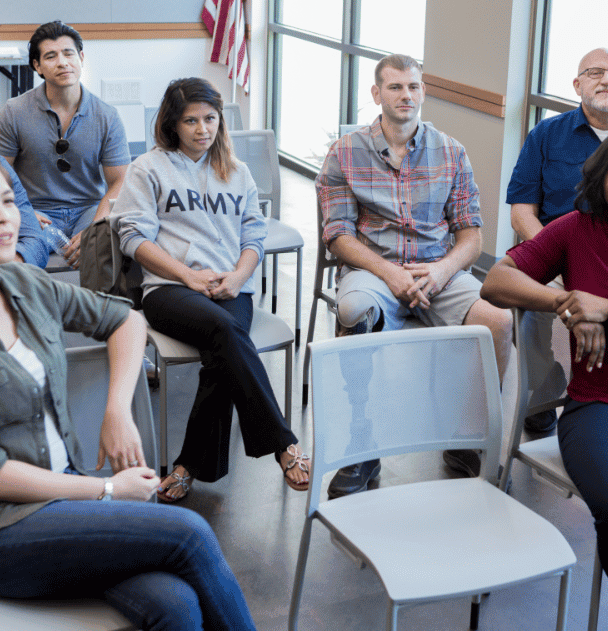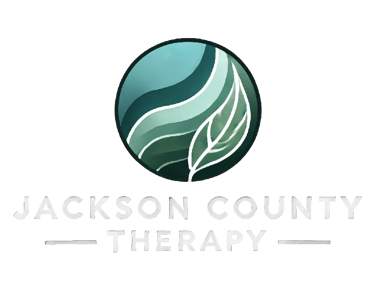
Specialized Group Therapy
This group will provide a safe, compassionate space for adult women healing from domestic violence and/or sexual assault. Facilitated by a trauma-informed clinician, the group will combine processing, peer support, and skill-building to help members move forward with strength and self-compassion.
If additional resources are needed now please visit National Domestic Violence Hotline
*Space is limited. Enrollment is currently open, with sessions to begin once minimum registration is met. If interested, please sign up for a free consultation using the button below to get discuss more details.


Group therapy offers a powerful blend of clinical guidance and peer connection. Whether you're processing trauma, developing life skills, or navigating a specific challenge, group therapy provides a safe and supportive space for healing and growth. Led by licensed clinicians, our groups emphasize empathy, structure, and shared understanding.
Group Therapy at
Jackson County Therapy
Upcoming Group: Women’s Domestic Violence & Sexual Assault Survivors Group
Types of Group Therapy
We are developing a range of therapeutic groups, including:
Process Groups – Focus on emotional expression, support, and shared insight.
Psychoeducational Groups – Centered around learning new skills (e.g., DBT, coping strategies).
Support Groups – Provide connection and encouragement around a shared experience or identity.
Trauma-Specific Groups – Focused on healing from PTSD, domestic violence, or other trauma histories.
Groups may be short-term or ongoing, structured or flexible, depending on clinical goals and group type.
Closed Groups: Start and end with the same members. These are best for building long-term trust and processing deep or sensitive material. They will include set start and end dates and require some level of commitment to attendance and completion as the material covered will generally build upon previous sessions.
Open Groups: Allow new members to join at set intervals. These offer flexibility and ongoing support for a wide variety of needs. These usually do not have set start and end dates and are generally ongoing with the ability to attend as desired with less of an attendance commitment
Each group is carefully matched based on client goals, fit, and readiness.
Open vs. Closed Groups


Frequently asked questions about Group Therapy
Q: Is group therapy confidential?
Yes. All group members are required to sign a confidentiality agreement, and sessions are held to the same privacy standards as individual therapy.
Q: How do I know if I’m a good fit for a group?
Before joining, you’ll complete a brief screening with a clinician to ensure the group aligns with your needs, goals, and readiness.
Q: Do I have to share my story in group therapy?
Sharing is encouraged but never forced. You’ll participate at your own pace, and support is provided throughout.
Q: Can I do group therapy and individual therapy at the same time?
Absolutely. Many clients benefit from combining both approaches for deeper support and growth.


Who Can Group Therapy Benefit?
Group therapy can be a powerful and effective treatment option for individuals from all walks of life. Whether you're working through trauma, managing symptoms of anxiety or depression, navigating life transitions, or simply seeking a greater sense of connection—group therapy offers support, insight, and growth in a shared environment.
Some of the unique advantages of group therapy include:
Connection and Belonging: Being in a group of individuals facing similar challenges helps reduce feelings of isolation and fosters a sense of community.
Peer Support and Inspiration: Hearing others' stories and strategies can offer hope and new perspectives for managing your own experiences.
Safe Space for Growth: Group therapy provides a supportive environment to try out new ways of thinking, relating, and behaving.
Enhanced Self-Awareness: Through both participation and observation, group members can better understand their own relational patterns and dynamics.
Affordability and Accessibility: Group therapy is typically more cost-effective than individual therapy, making it a valuable resource for consistent mental health care.
Group therapy is a meaningful option for many—and can be especially impactful when combined with individual therapy or other support services.


sign up today!
Call: (541) 414-4931
© 2024. All rights reserved.
Fax: (541) 646-7120
*If you are currently experiencing a crisis please call 541-774-8201 or Call / Text 988 (National Suicide & Crisis Lifeline)
Office: 670 Superior Ct, Medford, OR 97504


